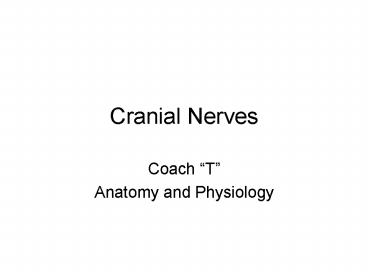Cranial Nerves - PowerPoint PPT Presentation
1 / 13
Title:
Cranial Nerves
Description:
Cranial Nerves Coach T Anatomy and Physiology iRespond Graph 67% 33% 100% 100% 67% A* B* C D E 0 1 2 3 iRespond Graph 67% 33% 100% 100% 67% A* B* C D E 0 1 2 3 ... – PowerPoint PPT presentation
Number of Views:108
Avg rating:3.0/5.0
Title: Cranial Nerves
1
Cranial Nerves
- Coach T
- Anatomy and Physiology
2
I -- Olfactory Nerve
- Extends from olfactory mucosa of nasal cavity to
olfactory bulb - Sense of smell
3
II -- Optic Nerve
- Connects to retina supplying vision
4
III Oculomotor Nerve
- Levator palpebrae raises eyelid (ptosis)
- 4 extrinsic eye muscles
- 2 intrinsic eye muscles
- accomodation for near vision (changing shape of
lens during reading) - constriction of pupil
5
IV Trochlear Nerve
- Superior oblique eye muscle
6
V Trigeminal Nerve
- Motor portion
- muscles of mastication
- Sensory portion
- touch, pain, temperature receptors of the face
- ophthalmic branch
- maxillary branch
- mandibular branch
7
VI Abducens Nerve
- Lateral rectus eye muscle
8
VII Facial Nerve
- Motor portion
- facial muscles
- salivary nasal and oral mucous glands tears
- Sensory portion
- taste buds on anterior 2/3s of tongue
9
VIII Vestibulocochlear Nerve
- Cochlear branch begins in medulla
- receptors in cochlea
- hearing
- if damaged deafness or tinnitus (ringing) is
produced - Vestibular branch begins in pons
- receptors in vestibular apparatus
- sense of balance
- vertigo (feeling of rotation)
- ataxia (lack of coordination)
10
IX Glossopharyngeal Nerve
- Stylopharyngeus m. (lifts throat during
swallowing) - Secretions of parotid gland
- Somatic sensations taste on posterior 1/3 of
tongue
11
X Vagus Nerve
- Receives sensations from viscera
- Controls cardiac muscle and smooth muscle of the
viscera - Controls secretion of digestive fluids
12
XI Spinal Accessory Nerve
- Cranial portion
- arises medulla
- skeletal mm of throat soft palate
- Spinal portion
- arises cervical spinal cord
- sternocleidomastoid and trapezius mm.
13
XII Hypoglossal Nerve
- Controls muscles of tongue during speech and
swallowing - Injury deviates tongue to injured side when
protruded - Mixed, primarily motor































